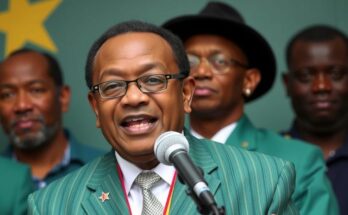Uruguay’s recent elections featured uninspiring candidates and resulted in a runoff due to failure to secure a majority. Young voters expressed feelings of disconnection and political apathy amid significant socio-economic challenges, raising concerns about the status of democracy in a nation historically celebrated for its stability.
In the recent presidential elections in Uruguay, many observers were struck by the subdued atmosphere, which diverges from the nation’s historical spirit of democratic vigor. The elections, characterized by uninspiring candidates and a lack of compelling rhetoric, resulted in no single candidate winning a majority of votes. Consequently, Uruguay faces a runoff, with citizens weary of a political process that appears detached from urgent social issues.
Uruguayans have enjoyed political stability for decades, at least partly due to the memory of past dictatorships that fuelled a commitment to democracy. However, the current elections have surfaced a pressing concern: the growing discontent among young citizens, who feel neglected despite Uruguay’s status as a regional example of success. A recent Latinobarómetro survey revealed that 38 percent of young respondents would prioritize effective government over democratic principles if their needs were met.
Economic challenges affecting the youth include the highest unemployment rate in Latin America, currently at 26 percent, alongside alarming dropout rates and disproportionate experiences of food insecurity and poverty. Recent data indicates one in five children lives in poverty, and mental health issues among young people have been exacerbated by the pandemic, leading to an alarming increase in suicides. It is this disenchantment that has fostered a climate of political apathy, also mirrored by disillusionment within older demographics regarding issues such as poverty, corruption, and rising crime.
Conversations with undecided young voters have highlighted a disconnect between them and the candidates vying for their support, specifically Yamandú Orsi and Álvaro Delgado. These voters expressed feelings of alienation, stating the candidates appear out of touch with real concerns facing the populace. As Uruguay prepares for its runoff election, the need for candidates to genuinely connect with the electorate becomes increasingly critical.
Uruguay is distinguished in Latin America for its political stability and democratic resilience, a legacy shaped by its historical experiences with dictatorship. However, recent electoral processes have raised alarms about growing apathy and dissatisfaction among the electorate, particularly younger voters facing numerous socio-economic challenges that influence their perspectives on governance and democracy. This year’s presidential elections present a pivotal moment to address these concerns and rejuvenate engagement across various demographics.
The recent elections in Uruguay reflect a troubling trend of disconnection between political candidates and the electorate, particularly among the youth. As they grapple with significant socio-economic challenges, the need for meaningful political dialogue and engagement is paramount. For Uruguay’s democracy to thrive, it will require leaders who are not only attuned to the historical lessons of the past but also responsive to the pressing issues of today.
Original Source: www.nytimes.com




